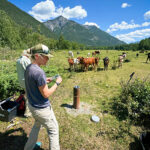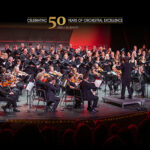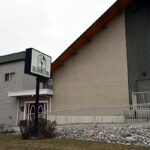Home »

Without Water Symposium tackled watershed security
On Thursday, June 5, the ‘Without Water’ Symposium took place on Yaq ̓ it ʔa·knuqⱡi’it First Nation territory (Grasmere), bringing together Indigenous leaders, scientists, government representatives, community members, and industry to address watershed values, knowledge, and decision making in southeast B.C.
Throughout the day, over 50 delegates discussed watershed challenges including drought, pollution, and the uncertainty of climate change. Yaq ̓ it ʔa·knuqⱡi’it Councillor Kyle Shottanana opened the event with a speech on the sacredness of water, and expressed powerful words during an interview on CBC’s Daybreak Kamloops.
“The necessity of water is in everything that we see,” said Shottanana during the interview. “Everything around us has to do with water from the plants, to the sky, and ʔa·kxam ̓ is q ̓ api qapsin – all living things”
The symposium intended to build relationships across sectors and worldviews, and explore how Indigenous, scientific, and local knowledge systems can inform watershed decision-making.
Joseph Yellow Horn, Environmental Technician for the Piikani Nation in Alberta, attended the event and said it was good to see people come together for the environment.
“It’s really relieving to see that the environment is taking a forefront in a lot of discussions now,” said Yellow Horn. “We’re always taught ecological practices through our traditions and cultures, but it’s really nice and refreshing to go into groups of like-minded people.”
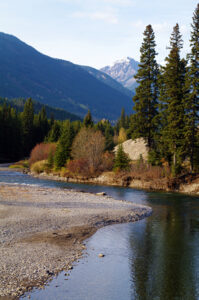
A key topic of the day was knowledge sharing, and increasing the communication between groups to improve collective decision-making.
Steve Fairbairn, Mayor for the District of Elkford, expressed his worries about the future of water in his area and the need to break down barriers between different groups.
“More and more people are seeing concrete limits to water access and water volumes, as well as water quality; people are worried,” said Mayor Fairbairn.
“People within silos have to be willing to share their information and know how to go about doing it, and people in different silos have to be willing to accept new information that doesn’t follow their perceived corporate or governance responsibilities.”
In the evening, 50 community members joined the daytime participants for a dinner, keynote speech, and a panel discussion.
Grand Chief Stewart Phillip, the President of the Union of British Columbia Indian Chiefs, delivered a powerful keynote on breaking down barriers, taking meaningful action, and creating a vision for a better future for the next generation.
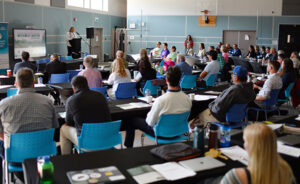 “It’s absolutely worth fighting for to protect what we can protect, collectively,” said Grand Chief Stewart Phillip, “but this movement is not a bystander movement, it’s not a polite movement. You have to show up, you have to speak out, and you gotta stand up, and we have to do it together.”
“It’s absolutely worth fighting for to protect what we can protect, collectively,” said Grand Chief Stewart Phillip, “but this movement is not a bystander movement, it’s not a polite movement. You have to show up, you have to speak out, and you gotta stand up, and we have to do it together.”
Following the keynote, a panel of representatives from Yaq ̓ it ʔa·knuqⱡi’it First Nation, local government, industry, scientists, and non-profits took to the stage to respond to communityquestions and concerns.
During the panel Dr. Stewart Rood, University of Lethbridge Professor of Biology and Environmental Science, summarized his learnings from the day.
“I would say, there were two points everyone agreed on, one: water is critical. It’s critical to us, it’s critical to the environment, it’s critical to life,” said Dr. Rood. “And two: water is threatened. Locally threatened, globally threatened.
“And it’s interesting that the ten speakers this morning from very different backgrounds, I think we all agree on those two points: water is critical, water is threatened.”
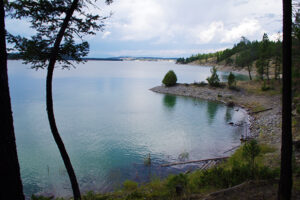
Dr. Stella Swanson, Study Board member on the International Joint Commission for the Elk-Kootenai/y reference, participated in the evening panel discussion. She urged for taking decisive action to resolve water quality issues using known solutions; words that were met with impassioned applause from the audience.
“Just get on with it,” said Dr. Swanson, “don’t dither, don’t make it into rocket science. It’s a lot of just basic chemistry, physics, and common sense.”
The ‘Without Water’ Symposium was organized by Yaq ̓ it ʔa·knuqⱡi’it First Nation, Living Lakes Canada, and the Elk River Alliance on behalf of the Elk River Watershed Collaborative Monitoring Program. Organizers hope this collaborative model can inspire other watershed regions across the province. Strengthened collaborative local watershed governance is one of the provincial government’s commitments included in the BC NDP–Green Party Agreement in Principle.
Caitlin Henneker, the Program Manager for the Elk River Watershed Collaborative Monitoring Program, said that this event was a great example of collaborative partnership.
“This is the largest event that the Elk River Monitoring Collaborative has ever organized, and the first one that involved full collaboration between several partner organizations,” said Henneker.
“What we’re trying to build is a model where the best available resources are combined to achieve the maximum potential. We want people from different perspectives to come together, learn from each other, and build a viable path to protect our waterways.”
A video of the keynote speech delivered by Grand Chief Stewart Phillip will be posted within two weeks on elkrivercollaborative.ca/engagement.
The organizers would like to express their deep gratitude to the following event funders: Yaq ̓ it ʔa·knuqⱡi’it, Real Estate Foundation of BC, Pacific Institute of Climate Solutions, Indigenous Environmental Network, First Nations Health Authority, Western Mining Action Network, Steel River Group, Sitka Foundation, Columbia Power, and Fortis BC.
Photos submitted by Vince Mo Media and Elk River Alliance
Elk River Alliance
